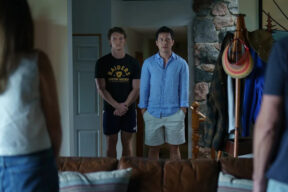By Anne T. Donahue
There’s a popular consensus among people who’ve been going through anything: at some point, former selves die and out of the ashes emerges the necessary update.
It’s a terrible, horrible, liberating, grounding process, and one usually sparked by anything from grief to needing an escape hatch out of mundanity to the boiling point of a long-simmering type of sadness. It feels isolating despite being an almost universal experience, and it tends to end with the revelation that it will likely happen again, where and when TBD.
Shortly after the pandemic started, I started feeling more and more like the life I’d cultivated wasn’t necessarily the life I wanted. I liked writing, I liked reading, and I liked making people laugh, but the inability to separate who I was from what I did began to feel smothering. I’d spent years defining myself by my job, and pinning all feelings of inferiority to an inability to achieve what my friends could. I’d thrown myself into work in a way I think many of us do, and as the pandemic delivered reminder after reminder that we all exist outside of our careers (to say the least), I began to resent mine and the person I’d morphed into to keep it going. Most evenings in 2020 and the top half of 2021, my dad and I would go for walks and talk about what life would look like if I didn’t double down on chasing goals I knew I didn’t want anymore, or the ways in which we’d both come to learn that we were enough simply as people; as human beings simply existing in the world and being thankful for things like the sunshine and family and the fact that neighbourhood cats liked to hang out on our deck.
And then my dad died. He died, and the shock and heartbreak marked the “after” to the extreme “before.” Nothing existed to me outside the feral grief that set in seconds after the paramedic told us it was over. My world was nothing but the pain that comes with the aftermath of sudden loss, which soon joined forces with another type of pain: the cruel type that accompanies the slow, torturous crawl of a loved one moving towards the end.
Exactly one month after losing my dad, my grandpa suffered a stroke when my mom and I were visiting him. And exactly three months following that, he died late on a Wednesday night, bringing with that moment relief that his suffering was over, but the stinging reminder that now he was gone. Death, something I like to remind anyone who is listening will come for us all, had staged a surprise attack and intertwined itself into my marrow. I felt like grief personified. And I certainly didn’t give a shit about what I was professionally perceived as.
The thing is, I’m hardly alone in my grief. I’m not the first person to lose a loved one, nor am I the first to jettison an old life for a future in which priorities have shifted from professional evolution to being super psyched to go to the landfill. (I fucking love the landfill.) Arguably, most of us are dealing with a profound and invasive grief that locks onto our DNA and refuses to leave until we change just enough to render it helpless. The loss – of all types – that we’ve all experienced in the last two years has rendered it impossible to return back to the selves we used to be. And it hurts, and it feels cruel, but it’s also quite freeing. Fuck the corners we painted ourselves into: we’re finally outside.
Which is the only way I can work with what I landed in over the last seven months. My dad and my grandpa weren’t men who rooted themselves in who they were. They moved forward, putting one foot in front of the other because that was the only choice they had. But between us, that choice is terrifying. I’d planned and plotted to the point of my future being completely mapped out — despite me having no real control over it, ever — and to move along as someone whose first descriptor isn’t “writer” seems almost irresponsible.
But I don’t think it is. The only time I’ve felt light or free lately has been when acknowledging that I have no idea, no map, no plan. I’m a person who happens to write, and outside of that is much more, likely more boring than what I foresaw for myself before the pandemic enveloped us. By letting go of what I believed “success” was has given me room to mourn my dad and my grandpa, and to mourn part of me that equated my worth with capitalistic ideals and how I stacked up against the people who mean the most to me. And while I have hopes for the future, they come with the footnote that it my idea of that future is temporary; that what I can control is the person I am and the way I make people feel. Which turns out to mean so much more than the type of milestones that somehow left me feeling worse.
Of course, this is just my experience. And I’m still very much being cocooned by the type of grief that hasn’t caught up to thoughts like, “Oh, I have to text dad about that!” or “Grandpa’s going to love this story.” I am, as they say, a mess. But I don’t think I’m the only person who is, or the only person whose world looks very differently now. So to that end, I say we give ourselves permission to let go of what once defined us (if we’re ready). We’re so much braver and stronger and capable than we give ourselves credit for; so much more able to change and to grow and to hold hands with this new messy version of self and venture into who knows. I’m just a broad, typing in front of the internet, realizing that work can be something I do to pay bills or buy a bucket hat. We were never just our jobs. Holy shit, pals, we’ve always been so much more.
Need a little more Anne? Read more from Anne T. Donahue right here!











